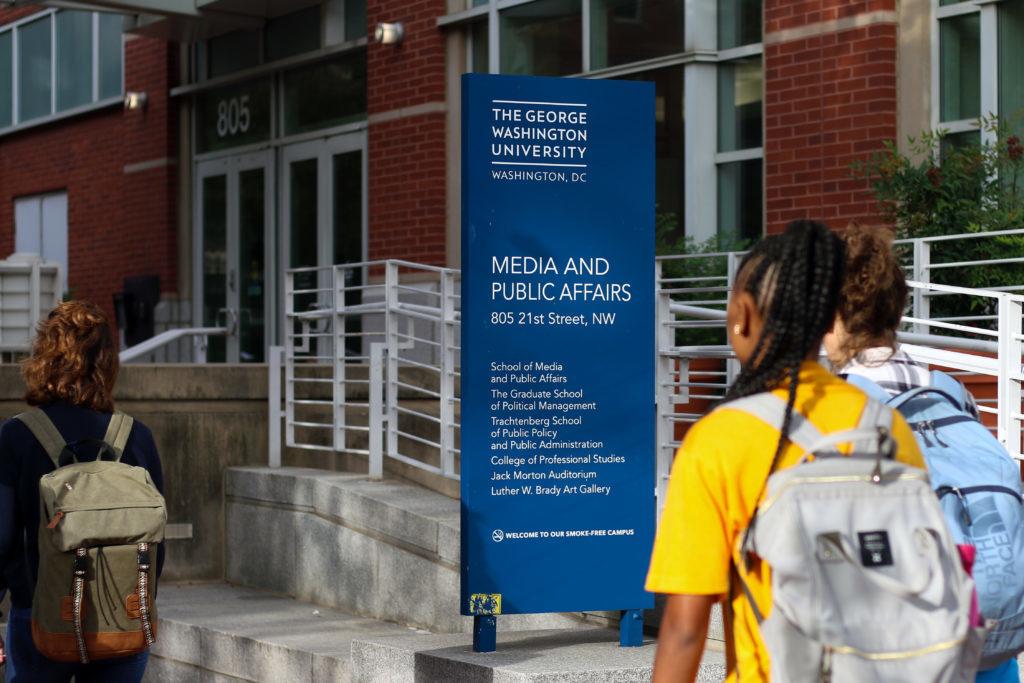Officials announced the creation of a new institute that will research the relationship between democracy and technology in a release last week.
The Knight Foundation – a nonprofit organization that invests in journalism and the arts – awarded a $5 million grant to GW to create the institute as part of a $50 million investment to further the study of the impact of technology, like digital propaganda, on democracy. The center, a School of Media and Public Affairs initiative, will be led by Steven Livingston, a professor of media and public affairs and international affairs.
“IDDP will have a direct and significant impact on the public and on journalism,” SMPA Director Frank Sesno said. “The institute reflects the belief that cross-disciplinary research can help us better understand these trends and that knowledge can catalyze action to support fact-based information and democracy itself.”
University spokesman Jason Shevrin said researchers in the institute will publish peer-reviewed journal articles as well as white papers – documents that break down complex issues – to educate journalists, policymakers and the public on technology issues. He said the institute will also host events that will inform journalists about “emerging” disinformation and how to best fact-check information online.
Shevrin said that while Livingston will head the institute, Sesno will serve in an “advisory” role. He added that faculty from the School of Engineering and Applied Science, the Elliott School of International Affairs and the Columbian College of Arts and Sciences – “particularly” from SMPA and the Department of Physics – will be affiliated with the new institute.
“As an interdisciplinary initiative of GW’s School of Media and Public Affairs, the institute will include faculty from across campus, researchers from around the world and collaboration with the Poynter Institute and its PolitiFact project,” he said.
Shevrin said SMPA faculty and University President Thomas LeBlanc pursued the Knight Foundation grant because they viewed the nonprofit’s call for proposals as an opportunity “ideally aligned” with GW’s mission and strengths.
He added that the institute will hire three post-doctorate researchers and administrative staff members and plans to establish a fellowship program for students, faculty and researchers.
Shevrin declined to say when the Knight Foundation grant was awarded.
Livingston, inaugural director of the IDDP, said researchers at the institute will examine why people believe false news stories and use its findings to “inform” what professors teach their students. He added that the institute will use social media data to track the spread of disinformation, which he defined as a “malicious” actor’s attempt to spread falsified information.
He said the Knight Foundation’s grant will provide funding for three years and will support data licensing, experimental research and research symposia.
“This is where is the old interdisciplinary boundaries are beginning to erode, and we’re a situation where from physics to political science, to journalism to communication, we’re all learning from one another,” he said.
Sam Gill, the vice president for communities and impact at the Knight Foundation, said in an email that the institute will give researchers greater insight into how to best correct false information spread digitally.
“There is clear evidence that, for all the positive potential of the internet, it has made our democracy vulnerable to misinformation and manipulation,” Gill said. “GWU’s new center will enable us to better understand – and tackle – misinformation and other threats to democracy in the digital age.”
Four other universities – Carnegie Mellon University, New York University, the University of North Carolina at Chapel Hill and the University of Washington – also received grants from the Knight Foundation to create inter-disciplinary research centers.
Media experts said the new research hub could prevent and correct the spread of falsified information on the internet, but cautioned that researchers should also educate the general public about the prevalence of fake news and how to identify false information online.
Nicole Kraft, an associate professor in the school of communication at the Ohio State University, said scholars in the institute should focus their efforts on how to train the general public to identify false information posted online. She said that people must learn to recognize fake news to ensure false narratives, like the link between vaccines and autism, don’t pose a danger to society.
“What we can do – theoretically and hopefully – is make people aware of the quality and quantity of inaccurate information and how to seek out quality information and form opinions based on verified, truthful info,” Kraft said.
Joseph Graf, an assistant professor of public communication who researches fake news at American University, said that while the institute’s research can partially stem the spread of fake news, distorted online narratives are a “threat” which requires a multifaceted solution.
“I applaud the institute and I think it sounds great, but I don’t think there’s a single solution, I don’t think there’s especially a single technological solution – I think it’s going to be a lot of things that we’ll have to address what’s really a social problem,” he said.





